1
We have become, by the power of a glorious evolutionary accident called intelligence, the stewards of life's continuity on earth. We did not ask for this role, but we cannot abjure it. We may not be suited to it, but here we are.Stephen Jay Gould
![[A]ny species that exempts itself from the rules of competition...](https://cdn.quotesoverflow.com/file/quotesoverflow/images/any-species-that-exempts-itself-from375465576687-1200.webp)
2
[A]ny species that exempts itself from the rules of competition ends up destroying the community in order to support its own expansion.Daniel Quinn
3
On a grander scale, when a society segregates itself, the consequences affect the economy, the emotions, and the ecology. That's one reason why it's easy for pro-lifers to eat factory-raised animals that disrespect everything sacred about creation. And that is why it's easy for rabid environmentalists to hate chainsaws even though they snuggle into a mattress supported by a black walnut bedstead.Joel Salatin
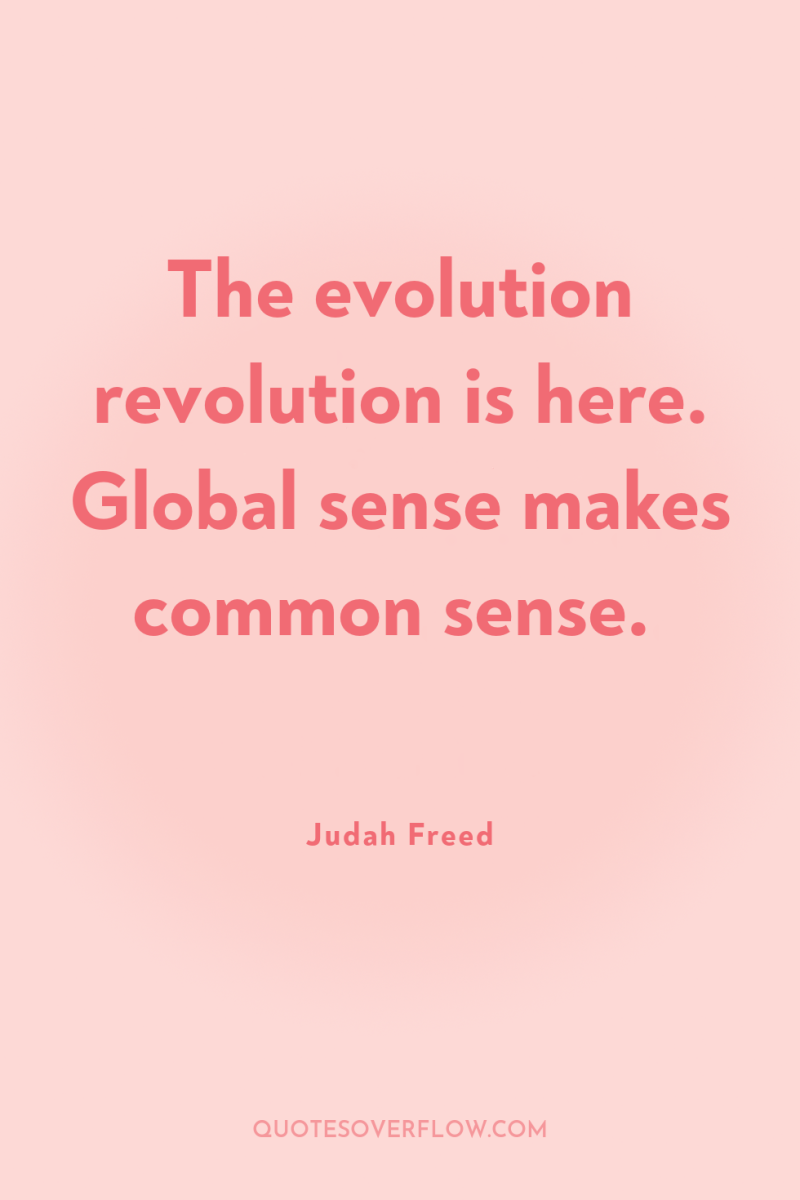
4
The evolution revolution is here. Global sense makes common sense.Judah Freed
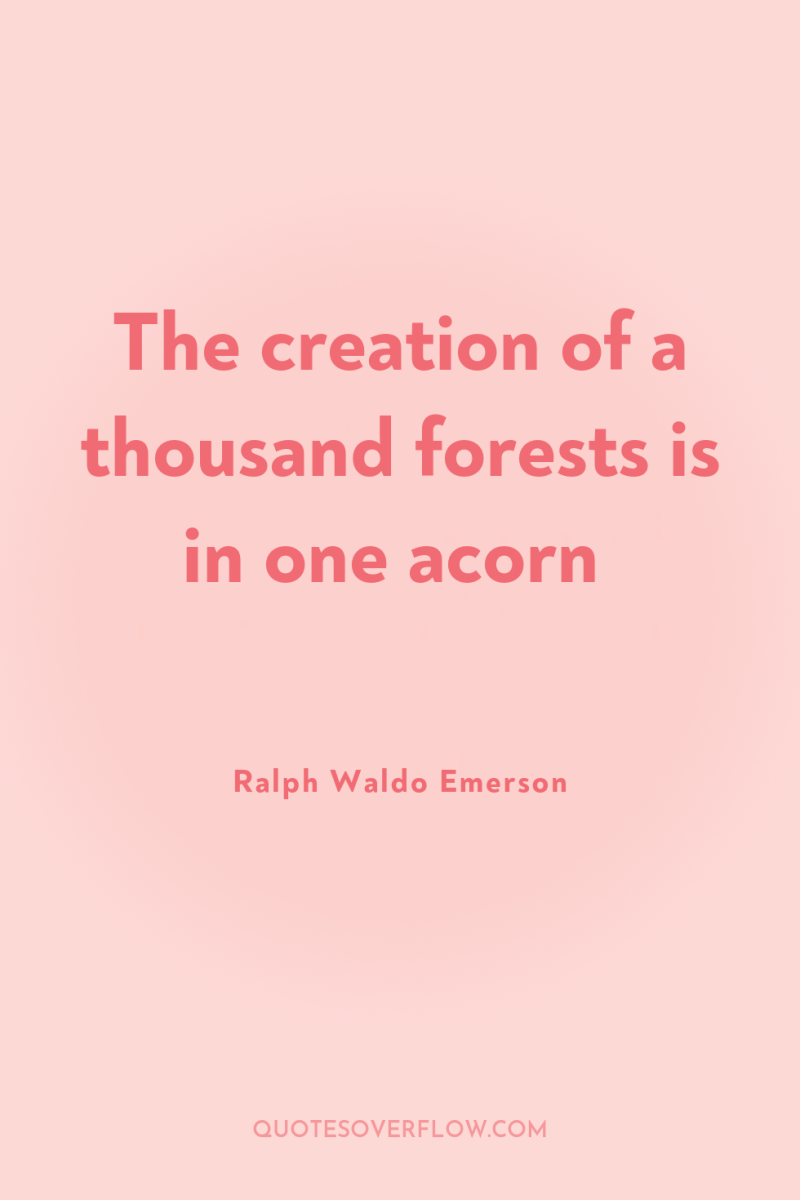
5
The creation of a thousand forests is in one acornRalph Waldo Emerson
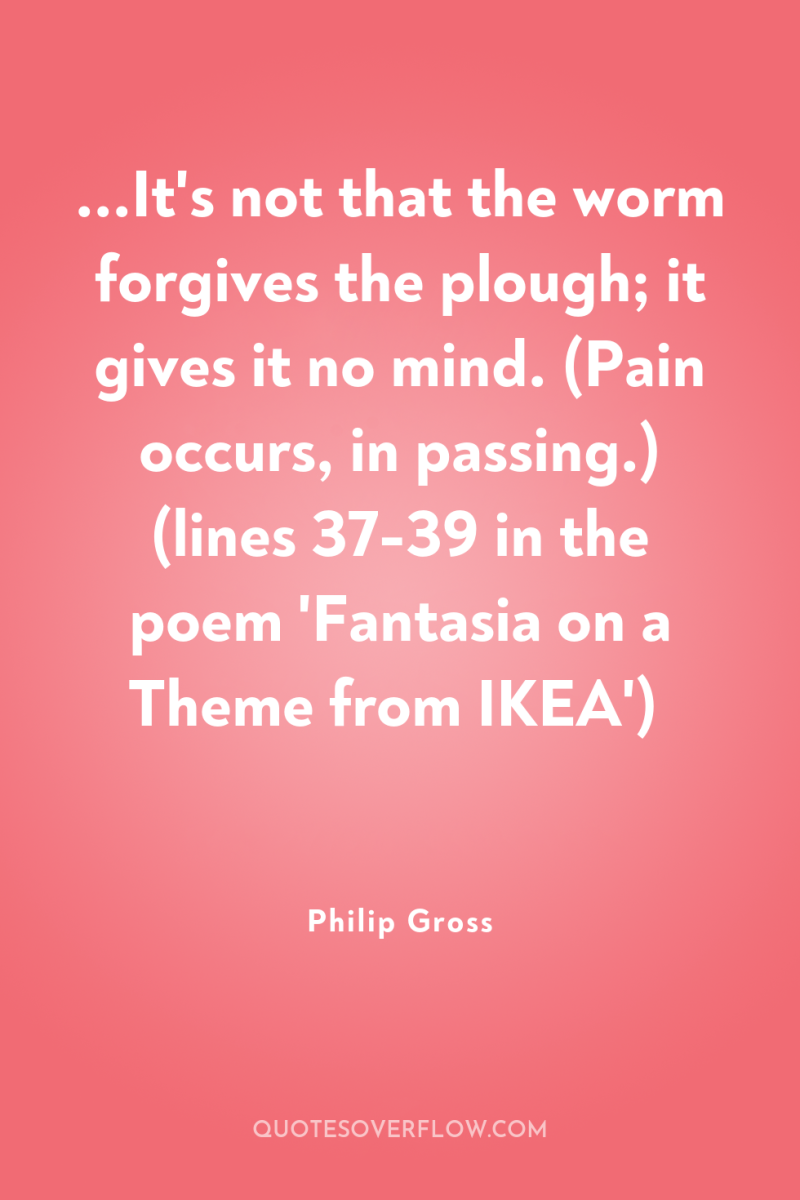
6
...It's not that the worm forgives the plough; it gives it no mind. (Pain occurs, in passing.) (lines 37-39 in the poem 'Fantasia on a Theme from IKEA')Philip Gross
7
It was not enough that food aplenty was within Man’s grasp: he wanted more. It was not enough that prey surrendered themselves to Man according to the natural order: Man wanted to cook his prey. Man had discovered fire when lightning stuck and set a tree or two alight, but he was clumsy and greedy and stupid and could not keep the flame aliveDavid Bowles
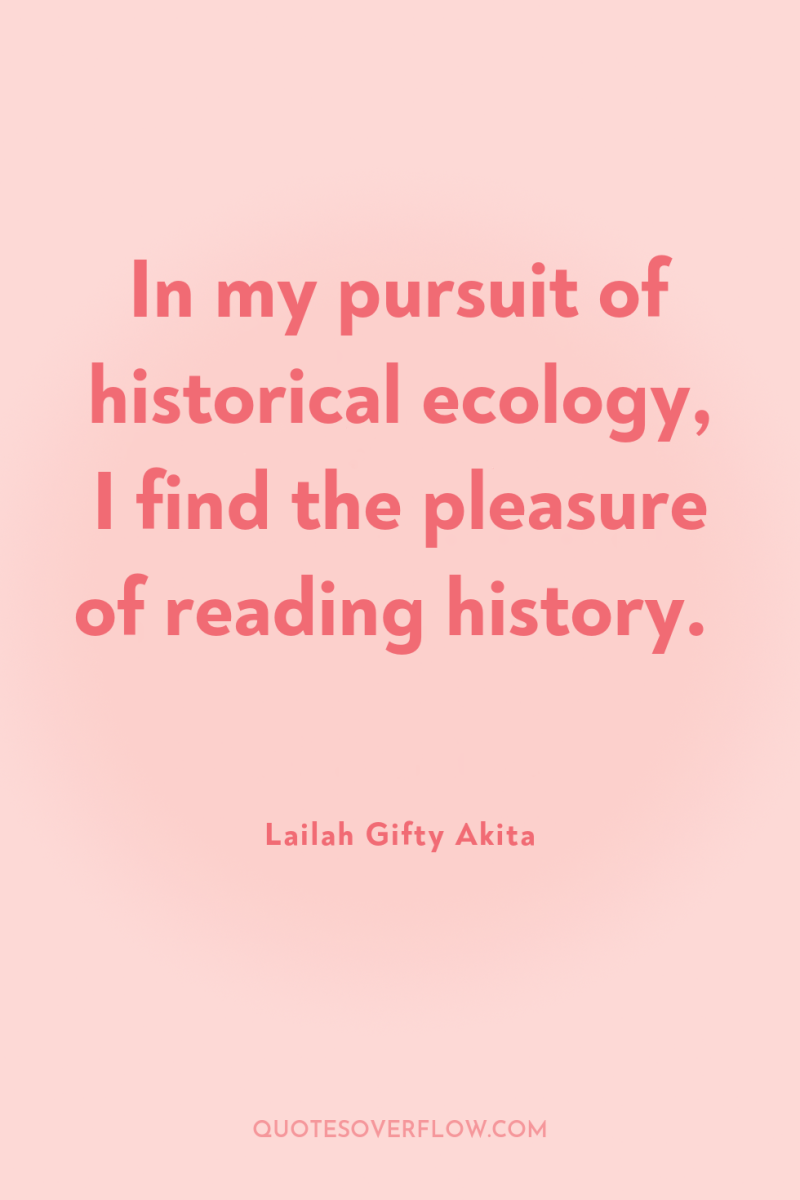
8
In my pursuit of historical ecology, I find the pleasure of reading history.Lailah Gifty Akita
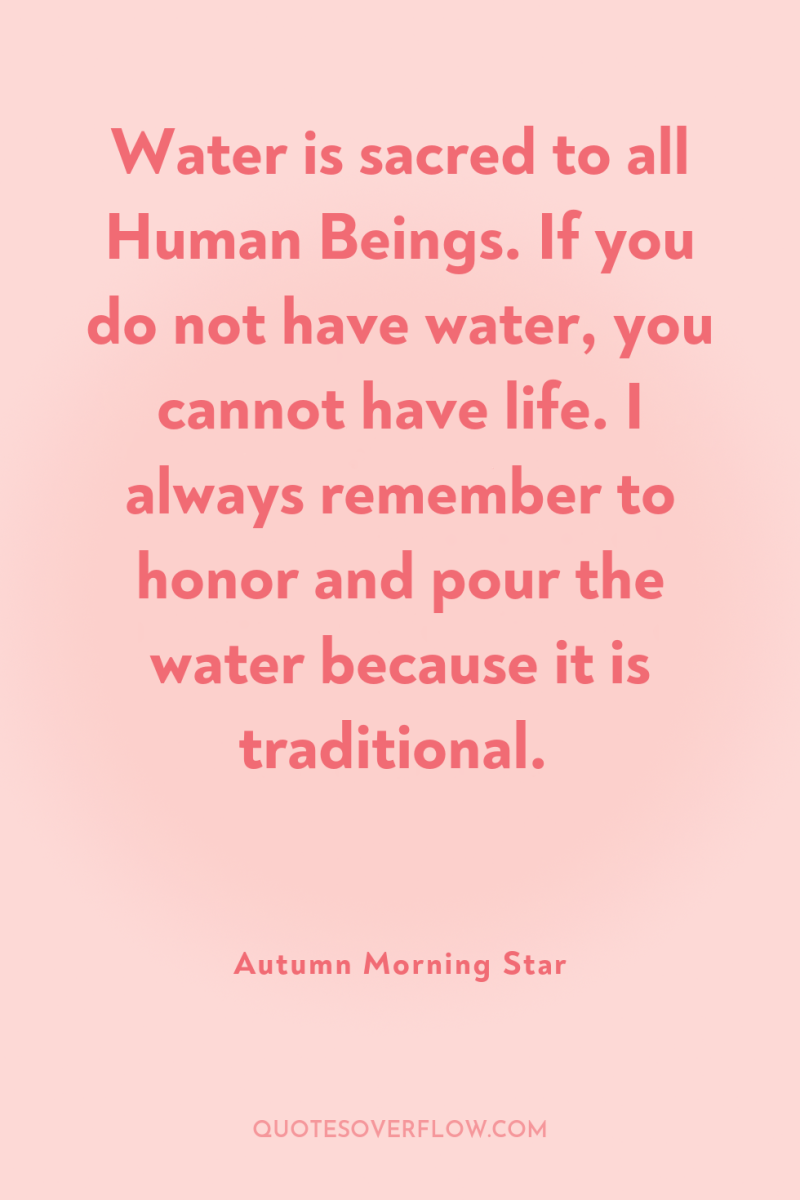
9
Water is sacred to all Human Beings. If you do not have water, you cannot have life. I always remember to honor and pour the water because it is traditional.Autumn Morning Star
10
Many conscientious environmentalists are repelled by the word "abundance, " automatically associating it with irresponsible consumerism and plundering of Earth's resources. In the context of grassroots frustration, insensitive enthusing about the potential for energy abundance usually elicits an annoyed retort. "We have to conserve." The authors believe the human family also has to _choose_. The people we speak with at the recycling depot or organic juice bar are for the most part not looking at the _difference_ between harmony-with-nature technologies and exploitative practices such as mountaintop coal mining. "Destructive" was yesterday's technology of choice. As a result, the words "science and technology" are repugnant to many of the people who passionately care about health, peace, justice and the biosphere. Usually these acquaintances haven't heard about the variety of constructive yet powerful clean energy technologies that have the potential to gradually replace oil and nuclear industries if allowed. Wastewater-into-energy technologies could clean up waterways and other variations solve the problem of polluting feedlots and landfills.Jeane Manning
11
We need myths that will help us to identify with all our fellow-beings, not simply with those who belong to our ethnic, national or ideological tribe. We need myths that help us to realize the importance of compassion, which is not always regarded as sufficiently productive or efficient in our pragmatic, rational world. We need myths that help us to create a spiritual attitude, to see beyond our immediate requirements, and enable us to experience a transcendent value that challenges our solipsistic selfishness. We need myths that help us to venerate the earth as sacred once again, instead of merely using it as a 'resource.' This is crucial, because unless there is some kind of spiritual revolution that is able to keep abreast of our technological genius, we will not save our planet. .Karen Armstrong
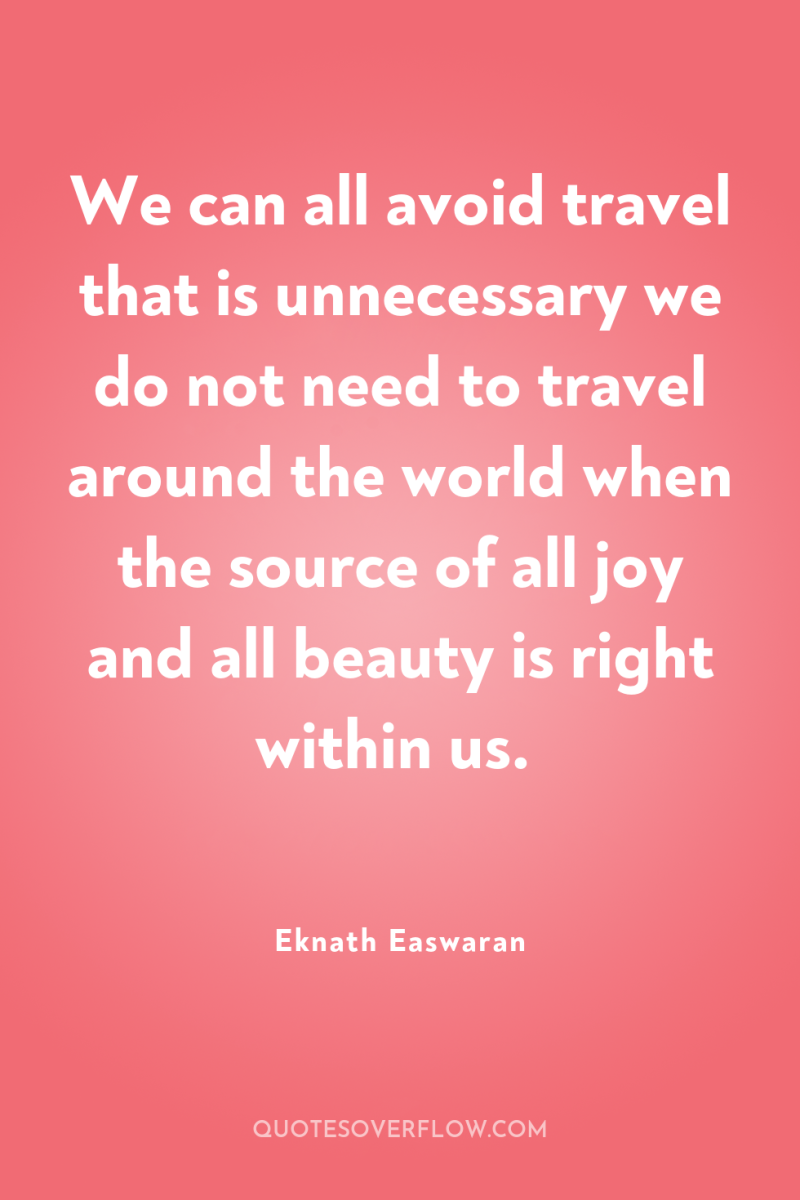
12
We can all avoid travel that is unnecessary we do not need to travel around the world when the source of all joy and all beauty is right within us.Eknath Easwaran
13
We can only predict the future ecological changes, by emergence of the past into the present.Lailah Gifty Akita
14
We study the past history, with the conscience of the present environmental changes; we can only predict the future ecological changes, by emergence of the past into the present.Lailah Gifty Akita
15
As jolaha ka maram na jana, jinh jag ani pasarinhh tana;dharti akas dou gad khandaya, chand surya dou nari banaya;sahastra tar le purani puri, ajahu bine kathin hai duri;kahai kabir karm se jori, sut kusut bine bhal kori; No one could understand the secret of this weaver who, coming into existence, spread the warp as the world; He fixed the earth and the sky as the pillars, and he used the sun and the moon as two shuttles; He took thousands of stars and perfected the cloth; but even today he weaves, and the end is difficult to fathom. Kabir says that the weaver, getting good or bad yarn and connecting karmas with it, weaves beautifully.Kabir
16
I thus found that the student who wishes for a shelter can obtain one for a lifetime at an expense not greater than the rent which he now pays annually. If I seem to boast more than is becoming, my excuse is that I brag for humanity rather than for myself; and my shortcomings and inconsistencies do not affect the truth of my statement.Henry David Thoreau
17
Now observe that in all the propaganda of the ecologists–amidst all their appeals to nature and pleas for “harmony with nature”–there is no discussion of man’s needs and the requirements of his survival. Man is treated as if he were an unnatural phenomenon. Man cannot survive in the kind of state of nature that the ecologists envision–i.e., on the level of sea urchins or polar bears.. In order to survive, man has to discover and produce everything he needs, which means that he has to alter his background and adapt it to his needs. Nature has not equipped him for adapting himself to his background in the manner of animals. From the most primitive cultures to the most advanced civilizations, man has had to manufacture things; his well-being depends on his success at production. The lowest human tribe cannot survive without that alleged source of pollution: fire. It is not merely symbolic that fire was the property of the gods which Prometheus brought to man. The ecologists are the new vultures swarming to extinguish that fire.Ayn Rand
18
I see young men, my townsmen, whose misfortune it is to have inherited farms, houses, barns, cattle, and farming tools; for these are more easily acquired than got rid of. Better if they had been born in the open pasture and suckled by a wolf, that they might have seen with clearer eyes what field they were called to labor in. Who made them serfs of the soil? Why should they eat their sixty acres, when man is condemned to eat only his peck of dirt? Why should they begin digging their graves as soon as they are born? .Henry David Thoreau
19
At first glance, northern hardwood and hemlock forests aren't very sexy - they are the accountants of the forest world, stable and consistent.Peter Quinby
20
For the natural polytheist, whose gods arise in and from the natural material world, this challenge is not even always a metaphor. Our gods not only have transcendent eyes and metaphysical hands. They have antlers and feathers, hooves and scales, fangs and horns and wings and fins and claws. They are in the lands we strip for veins of precious ore. They are in the waters we poison.Alison Leigh Lilly
21
For the natural polytheist who finds her gods in the rivers and mountains, in the deep-rooted giants looming above the canopy and in the tiny creatures that move beneath them, ecology gives us a glimpse into a kind of living anatomy of the divine, a theology of physical as well as spiritual life. - Alison Leigh Lilly, "Anatomy of a GodJohn Halstead
22
Your planet's immune system is trying to get rid of you.Kurt Vonnegut Jr.
23
By eating meat we share the responsibility of climate change, the destruction of our forests, and the poisoning of our air and water. The simple act of becoming a vegetarian will make a difference in the health of our planet.Thich Nhat Hanh
24
New cells are born everyday and old cells die, but they have neither funerals nor birthdays.Thich Nhat Hanh
25
In all honesty, I don’t envy you the possession of this power over memory, nor do I admire you. Because humans are usually completely unconcerned with the memories of other creatures. Human existence involves the willful destruction of the existential memories of other creatures and of your own memories as well. No life can survive without other lives, with the ecological memories of other living creatures have, memories of the environments in which the live. People don’t realize they need to rely on the memories of other organisms to survive. You think that flowers bloom in colorful profusion just to please your eyes. That a wild boar exists just to provide meat for your table. That a fish takes the bait just for you sake. That only you can mourn. That a stone falling into a gorge is of no significance. That a sambar deer, its head bent low to sip at a creek is not a revelation . When in fact the finest movement of any organism represents a change in an ecosystem.” The man with the compound eyes takes a deep sign and says: “But if you were any different you wouldn’t be human. .Wu MingYi
26
There is but one world and everything that is imaginable is necessary to it. For this world also which seems to us a thing of stone and flower and blood is not a thing at all but is a tale. And all in it is a tale and each tale the sum of all lesser tales and yet these are also the selfsame tale and contain as well all else within them. So everything is necessary. Every least thing. This is the hard lesson. Nothing can be dispensed with. Nothing despised. Because the seams are hid from us, you see. The joinery. The way in which the world is made. We have no way to know what could be taken away. What omitted. We have no way to tell what might stand and what might fall. And those seams that are hid from us are of course in the tale itself and the tale has no abode or place of beind except in the telling only and there it lives and makes its home and therefore we can never be done with the telling. Of the telling there is no end. And . in whatever . . place by whatever . name or by no name at all . all tales are one. Rightly heard all tales are one.Cormac McCarthy
27
My passion for human ecology was not a drive for closure–but rather the joy of endless openings and newfound connections. There is no final goal or perfect completion, only the expanding experience of being alive.Richard J. Borden
28
Ecology is beginning to slowly shift focus with tentative explorations of what the world would look like if process, rather than matter were the basis for reality What if we defined a species in terms of its life processes? We might seriously doubt whether the California condor or the tall grass prairie can be 'saved' or even 'restored.' Perhaps we can re-create some local conditions that foster a few nests of condors or a few acres of prairie. But the life process of the condor ended with the urbanization of the California foothills and the living ebb and flow of the tall grass prairies died with the plowing of the Great Plains. What if we suggested that a thing is what it does? In this light, the Rocky Mountain locust was a immense aperiodic energy flow that linked life processes on a continental scale. This notion of life-as-process might seem unusual in a society in which material existence is primary. But such a perception informs our deepest understanding of life. Indeed, life-as-process underlies our notion of euthanasia. When loved ones are simply bodies, devoid of the capacity to care, respond, or relate again a away that we can recognize as being "them, " we understand that they are gone even before they are dead. .Jeffrey A. Lockwood
29
Some people hear the voice of God in their dreams or through prayer or meditation. For me, God is truly in the details–the details found in the connections between the living things on the planet all working together to maintain the atmosphere and the soil.Timothy Goodwin
30
The word ecology is derived from the Greek oikos, the word for home.Robin Wall Kimmerer
31
Whatever you do to the animals, you do to yourself.Ben Mikaelsen
32
Let me outline briefly as I can what seem to me the characteristics of these opposite kinds of mind. I conceive a strip-miner to be a model exploiter, and as a model nurturer I take the old-fashioned idea or ideal of a farmer. The exploiter is a specialist, an expert; the nurturer is not. The standard of the exploiter is efficiency; the standard of the nurturer is care. The exploiter's goal is money, profit; the nurturer's goal is health -- his land's health, his own, his family's, his community's, his country's. Whereas the exploiter asks of a piece of land only how much and how quickly it can be made to produce, the nurturer asks a question that is much more complex and difficult: What is its carrying capacity? (That is: How much can be taken from it without diminishing it? What can it produce dependably for an indefinite time?) The exploiter wishes to earn as much as possible by as little work as possible; the nurturer expects, certainly, to have a decent living from his work, but his characteristic wish is to work as well as possible. The competence of the exploiter is in organization; that of the nurturer is in order -- a human order, that is, that accommodates itself both to other order and to mystery. The exploiter typically serves an institution or organization; the nurturer serves land, household, community, place. The exploiter thinks in terms of numbers, quantities, "hard facts"; the nurturer in terms of character, condition, quality, kind.Wendell Berry
33
Of all creatures on earth, in proportion to their size and weight, humans have the smallest footprint on the ground and the largest on the environment.R. N. Prasher
34
It is clear that corporate America has an obligation to create a fairer, more equitable, more sustainable economy for no other reason than self-preservation.John J. Sarno
35
The social phenomenon of economic growth is, thanks to the principle of the conservation of matter, nothing other than the physical phenomenon of increasing resource depletion.Craig Dilworth
36
Americans make more trash than anyone else on the planet, throwing away about 7.1 pounds per person per day, 365 days a year. Across a lifetime that rate means, on average, we are each on track to generate 102 tons of trash. Each of our bodies may occupy only one cemetery plot when we’re done with this world, but a single person’s 102-ton trash legacy will require the equivalent of 1, 100 graves. Much of that refuse will outlast any grave marker, pharaoh’s pyramid or modern skyscraper: One of the few relics of our civilization guaranteed to be recognizable twenty thousand years from now is the potato chip bag. .Edward Humes
37
This is where the will to grapple with our hard and pressing environmental problems begins: in relationship to something other that you love beyond any utility, beyond any logic.Susan Freinkel
38
A nation that destroys its soils destroys itself. Forests are the lungs of our land, purifying the air and giving fresh strength to our people.Franklin D. Roosevelt
39
The dominant culture eats entire biomes. No, that is too generous, because eating implies a natural biological relationship. This culture doesn't just consume ecosystems, it obliterates them, it murders them, one after another. This culture is an ecological serial killer, and it's long past time for us to recognize the pattern.Aric McBay
40
Compared to forest or aquatic ecosystems, grassland is unstable. It requires rather precise geological and climatic conditions, and if these conditions are not maintained--if too much rain falls, or too little--it quickly turns into forest or desert, both of which are dominated by woody plants. This instability is reflected in the spectacular but brief careers of various grassland faunas. Humanity, with its dazzling symbioses, preadaptations, and neoteny, is the most spectacular of these--and may well be the briefest. .David Rains Wallace
41
We travel together, passengers on a little space ship, dependent on its vulnerable reserves of air and soil; all committed for our safety to its security and peace; preserved from annihilation only by the care, the work, and, I will say, the love we give our fragile craft. We cannot maintain it half fortunate, half miserable, half confident, half despairing, half slave–to the ancient enemies of man–half free in a liberation of resources undreamed of until this day. No craft, no crew can travel safely with such vast contradictions. On their resolution depends the survival of us all. .Adlai Stevenson
42
We can and must respond creatively to the triple crisis and simultaneously overcome dehumanization, economic inequality, and, ecological catastrophe.Vandana Shiva
43
Water is always working, reorganizing the land.Tim Palmer
44
Strategies that did well in competition with other strategies were not, however, those that maximized the returns to agents. Rather, we found a strong inverse relationship between the mean fitness of individuals in populations containing only one strategy, and that strategy's performance in the tournament. This finding illustrates the parasitic effect of strategies that rely heavily on OBSERVE. Strategies using a mixture of social and asocial learning are vulnerable to being outcompeted by those using social learning alone, which may result in a population with lower average returns. These findings are evocative of an established rule in ecology; this specifies that, among competitors for a scarce resource, the dominant competitor will be the species that can persist at the lowest resource level. An equivalent rule may apply when alternative social learning strategies compete: the strategies that eventually dominates will be the one that can persist with the lowest frequency of asocial learning.Kevin N. Laland
45
REVIEW: Like a master artisan, Weisberger weaves together threads of anthropology, botany, ecology and psychology in an inspiring tapestry of ideas sure to keep discerning readers warm and hopeful in these cold and desolate times. Unlike other texts, which ordinarily prescribe structural (ie. social, political, economic) solutions to the global crisis of environmental destruction, Rainforest Medicine hones in on the root cause of Western schizophrenia: spiritual poverty, and the resultant alienation of the individual from his environment. This incisive perception is married to a message of hope: that the keys to the door leading to promising new human vistas are held in the humblest of hands; those of the spiritual masters of the Amazon and the traditional cultures from which they hail. By illumining the ancient practices of authentic indigenous Amazonian shamanism, Weisberger supplies us with a manual for conservation of both the rainforest and the soul. And frankly, it could not have arrived at a better time.Jonathon Miller Weisberger
46
All have their worth and each contributes to the worth of the others.J.r.r. Tolkien